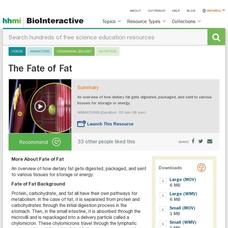Science Buddies
How Do Viruses React To Soap?
Have you ever wondered why we wash our hands with water and soap to get rid of bacteria and viruses? Good hand hygiene becomes especially important during viral outbreaks such as the COVID-19 pandemic! The CDC (Center for Disease...
Curated Video
Life Substances - The Chemistry of life
There are a number of substances that are vital to all living organisms. In this lecture, I talk about substances like carbohydrates, lipids, proteins and nucleic acids, going into some detail about their structures and importance.
Curated Video
Introduction to Quantitative Reagent Tests for Carbohydrates, Lipids, and Proteins
The video is a tutorial on the required practical activities for biology specification that involve the use of quantitative reagents to test for different kinds of carbohydrates, lipids, and proteins. The presenter explains the steps...
Professor Dave Explains
Lipids Part 1: TAGs, Fatty Acids, and Terpenes
What's butter made of? What about olive oil? Well they're lipids, which are largely nonpolar substances. Why is one solid at room temperature and the other is liquid? What are trans fats and why are they bad for you? Let's find out all...
Mazz Media
Integumentary System (Overview)
In this live-action program viewers will learn that the integumentary system is the body’s barrier between its interior and the outside. It is an organ system consisting of the skin, hair, nails, and exocrine glands. Students will come...
Next Animation Studio
How soap destroys a virus
Washing your hands thoroughly with soap is one of the most effective ways to eliminate SARS-CoV-2, the virus that causes COVID-19, from your skin, according to Taiwan’s Centers for Disease Control.
Catalyst University
Microbiology Lab | Acid Fast Staining
This video covers: 1) What are Acid-fast organisms? 2) Two genera of Acid-fast organisms 3) How staining is done 4) Interpreting Microscope Image (Acid-fast vs non-Acid-fast)
Professor Dave Explains
Lipids Part 2: Steroids
Steroids have gotten a pretty bad rap! In reality, they're not just the big bad anabolic steroids. This class of molecules includes many vitamins as well as cholesterol. Cholesterol has also gotten a bad rap! We need cholesterol for our...
Catalyst University
Accessory Organs of the Small Intestine [Liver, Gallbladder, & Pancreas]
Here, we explore some of the anatomy of the liver, gallbladder, and pancreas. We also explore how the liver and pancreas secrete their respective secretions [bile and enzymes/bicarbonate] into the duodenum.
Mazz Media
Biochemistry
This live-action video program is about the word Biochemistry. The program is designed to reinforce and support a student's comprehension and retention of the word Biochemistry through use of video footage, photographs, diagrams and...
Mazz Media
Integumentary System
In this live-action program viewers will learn that the integumentary system is the body's barrier between its interior and the outside. It is an organ system consisting of the skin, hair, nails, and exocrine glands. Students will come...
Visual Learning Systems
Exploring the Digestive and Excretory Systems: the Role of Digestion
This series of videos takes students on a fascinating journey, following food as it travels through the digestive system. Clear animations illustrate the functions of the major digestive and excretory structures. Concepts and terminology...
FuseSchool
Biological Molecules
Molecules make you think of chemistry, right? Well, they also are very important in biology too. In this video we are going to look at carbohydrates, proteins and lipids. When I say lipids, I am talking about fats and oils. Life...
FuseSchool
Digestive enzymes
In this video, we’re going to look at the enzymes involved in digestion in more detail.
Bozeman Science
Biological Molecules
Focus on macro-molecules including nucleic acids, proteins, lipids, and carbohydrates. A video explains which are monomers, which form polymers, and the process of changing from one to the other. It also covers the characteristics of...
Curated OER
The Inner Life of a Cell - Harvard University
The inner life of a cell is laid out like a science fiction film. With dramatic music playing in the background, show your learners how the organelles interact and perform. This highly scientific clip is very detailed and is geared...
Bite Sci-zed
Saturated vs. Unsaturated Fats
What are good fats and bad fats? Learn about the structure and function of lipids and how that relates to carbon bonding. Scholars explore the structural differences between saturated and unsaturated fats and examine relevant...
Howard Hughes Medical Institute
PPAR-gamma Activation in the Fat Cell
Each human contains more than six times the number of fat cells than there are people on the planet. Scholars learn how fat cells work to absorb fat and release hormones through a short animation. They recognize the relationship between...
Howard Hughes Medical Institute
The Fate of Fat
Humans need fat for energy and nutrition, but how much is too much? A short animation shows the pathway of fat as it enters the body, breaks down through digestion, and travels for use or storage. Teaching tips offer multiple ways to...
Howard Hughes Medical Institute
Structure of Dengue Virus
The dengue virus looks like a ball with multiple layers. View an animation of each layer while hearing a description of its properties, from the outer symmetrical units to the lipid envelope, the capsid, and finally the RNA genome.
Socratica
What Are CHNOPS?
It's the stuff of life! Where would we be without CHNOPS? Biology scholars discover the elements essential to life with a video from an engaging biology playlist. Topics covered include lipids, proteins, and DNA, as well as the trace...
Socratica
What Is Biochemistry?
Watch as chemistry comes alive! Socratica's biology playlist kicks off with a simple video detailing the principle components of biochemistry. Content includes carbohydrates, proteins, and nucleic acids. The narrator describes each class...








